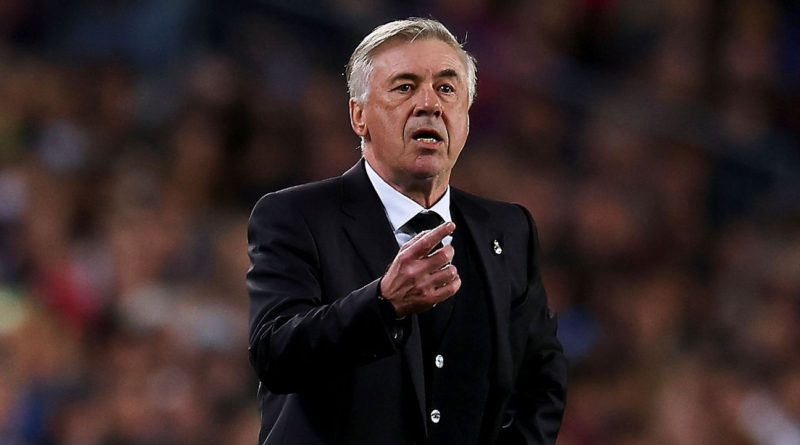Real Madrid march on and Brazil still wait for diplomat Ancelotti
Chelsea were unable to do Brazil a favour. Nor, before them, were Liverpool. And so Real Madrid go marching on in the Champions League — making it hard for Brazil to fill their coaching vacancy.
After yet another World Cup disappointment, Brazil seem willing, for the first time on any definitive basis, to appoint a foreigner to take charge of the national team. And the name at the top of their wish list is Carlo Ancelotti. But there is a problem. Ancelotti is happy at Real Madrid, and keeps stressing his desire to see out the end of his contract, which comes to an end in of summer 2024.
There is, then, only one way that he can suddenly become available to take the Brazil job — if Real Madrid decide to dispense with his services. There has been some speculation that this might happen if Real are unable to defend the Champions League title they won last season. But here they are in the last four of the competition. Semifinal opponents Manchester City can do something about that next month. In the meantime, Brazil wait — because while there is a chance of landing Ancelotti, they clearly believe he is worth waiting for.
This is hardly a surprise. The 63-year-old Italian has an imposing CV; four Champions League titles (to date), plus wins in all of the big five European leagues across stints at Juventus, AC Milan, Chelsea, Paris Saint-Germain, Bayern Munich, Napoli, and Everton — and his two stints in Madrid.
But in the case of Ancelotti, what makes him so desirable to Brazil goes well beyond the results. It is the way that he goes about his business.
Bringing in a foreign coach is a bold step. There is, it appears, no resistance from the players. They, after all, operate in a globalised environment, with multicultural, multilingual dressing rooms. And some of the big names already have an excellent relationship with him. Vinicius Junior, for example, makes it clear that he wants to continue working with Ancelotti, either with club or country.
But there will be plenty of resistance to the idea of perhaps the foremost symbol of the nation being placed in foreign hands. The Brazilian coaching fraternity will not be impressed, neither will sections of the nation’s press. And older people, those who did not grow up with today’s globalised game, may also have misgivings. Therefore, Brazil’s first foreign boss will have to be something of a diplomat — and this is a role for which Ancelotti was born.
It is easy to look at the likes of Pep Guardiola and Jose Mourinho and see how much the stresses of elite level coaching have aged them. Not Ancelotti. His style of leadership is suave, low key. The iron jaw keeps chomping away at the chewing gum, there is the odd sardonic raise of an eyebrow — and the titles keep rolling in.
Perhaps a formative coaching experience was his failure to incorporate the talents of Italian playmaker Roberto Baggio in his then rigid 4-4-2 system. The more mature Ancelotti has been a model of quiet flexibility, shrewdly working with what he has instead of trying to bend the world to his will. So effectively has he done it that some wonder what it is that he actually does.
Ancelotti is a living example of Gene Kelly’s dictum that if it looks like you’re working, then you’re not working hard enough. Carlo Ancelotti, then, would charm away some of the attacks based on wounded Brazilian nationalism, and he would doubtless soon have the players in the palm of his hand.
But even Ancelotti cannot be in two places at the same time. So what do Brazil do? Do they cheer for Manchester City or trust that Madrid president Florentino Perez will wield the axe? Do they feel confident that Ancelotti would take their offer if he were to become available?
World Cup qualification starts in September, with a Copa America set for the middle of next year. True, the pressure will not be at its fiercest — with the World Cup extended to 48 nations it is all but impossible to imagine Brazil not making the cut. And the Copa America is not as big a deal in Brazil as it is in most other countries in the continent. The 2026 World Cup will be the real measuring rod of any decision that Brazil’s football association (CBF) takes.
There could be a rival candidate in Jorge Jesus, the Portuguese who had such a magical spell in charge of Rio giants Flamengo in 2019. He is currently with Fenerbahce in Turkey, and seemed in no hurry to make himself available for the Flamengo job when it was recently on offer. Is he banking on an approach from the CBF?
Perhaps everything will become clear a month from now. The Champions League semifinals will have been played, we will know whether or not Real Madrid are still alive in the competition — and if they have been eliminated, we might know how Perez will react. Until then, the only guarantee is that Ancelotti will keep chewing his gum and raising that iconic eyebrow.




